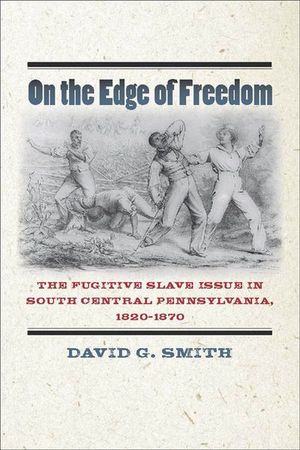On the Edge of Freedom
Published by Fordham University Press
This groundbreaking Civil War history illuminates the unique development of antislavery sentiment in the border region of south central Pennsylvania.
During the antebellum decades every single fugitive slave escaping by land east of the Appalachian Mountains had to pass through south central Pennsylvania, where they faced both significant opportunities and substantial risks. While the hundreds of fugitives traveling through Adams, Franklin, and Cumberland counties were aided by an effective Underground Railroad, they also faced slave catchers and informers.
In On the Edge of Freedom, historian David G. Smith traces the victories of antislavery activists in south central Pennsylvania, including the achievement of a strong personal liberty law and the aggressive prosecution of kidnappers who seized African Americans as fugitives. He also documents how their success provoked Southern retaliation and the passage of a strengthened Fugitive Slave Law in 1850.
Smith explores the fugitive slave issue through fifty years of sectional conflict, war, and reconstruction in south central Pennsylvania and provocatively questions what was gained by emphasizing fugitive protection over immediate abolition and full equality. Smith argues that after the war, social and demographic changes in southern Pennsylvania worked against African Americans’ achieving equal opportunity. Although local literature portrayed this area as a vanguard of the Underground Railroad, African Americans still lived “on the edge of freedom.”
Winner of the Hortense Simmons Prize
During the antebellum decades every single fugitive slave escaping by land east of the Appalachian Mountains had to pass through south central Pennsylvania, where they faced both significant opportunities and substantial risks. While the hundreds of fugitives traveling through Adams, Franklin, and Cumberland counties were aided by an effective Underground Railroad, they also faced slave catchers and informers.
In On the Edge of Freedom, historian David G. Smith traces the victories of antislavery activists in south central Pennsylvania, including the achievement of a strong personal liberty law and the aggressive prosecution of kidnappers who seized African Americans as fugitives. He also documents how their success provoked Southern retaliation and the passage of a strengthened Fugitive Slave Law in 1850.
Smith explores the fugitive slave issue through fifty years of sectional conflict, war, and reconstruction in south central Pennsylvania and provocatively questions what was gained by emphasizing fugitive protection over immediate abolition and full equality. Smith argues that after the war, social and demographic changes in southern Pennsylvania worked against African Americans’ achieving equal opportunity. Although local literature portrayed this area as a vanguard of the Underground Railroad, African Americans still lived “on the edge of freedom.”
Winner of the Hortense Simmons Prize
BUY NOW FROM
COMMUNITY REVIEWS

